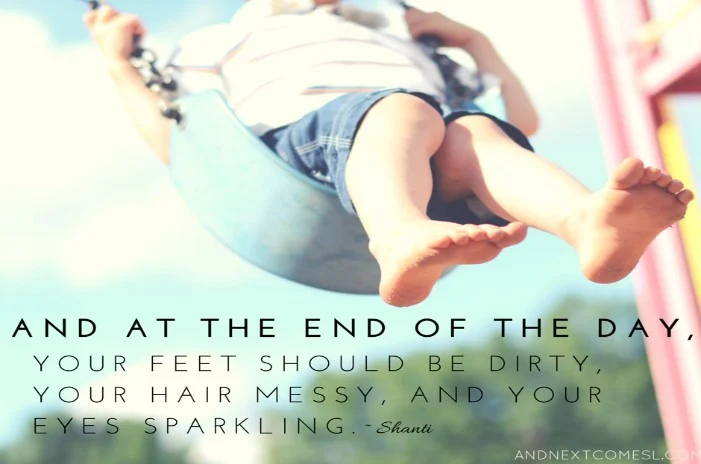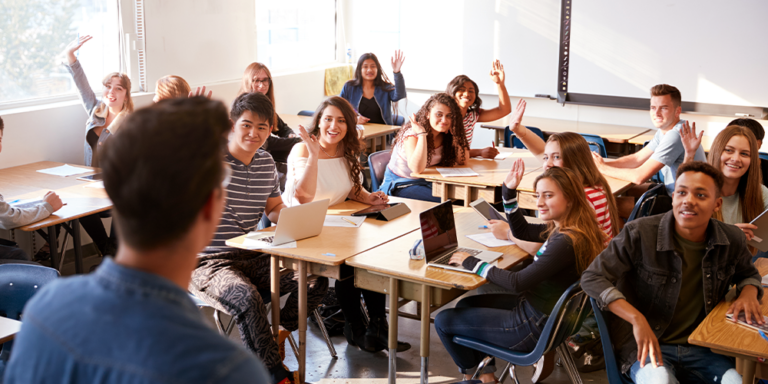This week’s blog post writer, Susanne Leslie, is a Curriculum & Instruction Specialist with Learners Edge. Prior to joining the Edge, Susanne worked as a parent educator in Minnesota’s Early Childhood Family Education (ECFE) program and worked with parents of 0-5 year olds- which, we think, gives her special insight into the importance of being little. Susanne is the proud parent of two daughters, Annika and Alexandra. Below Susanne shares her insights about being little and the importance that it plays in early childhood education and development.
My memories of being little are good.
In the 1970’s television show Star Trek, there was only one female officer, Lieutenant O’Hura. As long as I got to run and jump from rooftop to rooftop, stretching my legs—knowing if I missed, I’d crash to the cement between the garages, I’d be anyone they told me to be. All I cared about was joining my big brother and his friends in their Star Trek game, and I knew if I wanted to stay, I had to keep up. It thrilled me to push myself beyond what I thought capable.
Returning from a week “off the grid” means my desk will be loaded with books waiting for my review. Most often, the books with colorful covers catch my eye, but this time, a book with a clean, simple, white cover and an intriguing title, invited me to investigate:
The cover and title, represented in a pure way—the significance of childhood. The significance of being little and how grown ups can help.
Before reading the book, I decided to create my own list of what I believe to be the most significant things about childhood and how important allowing children to be little is in childhood development.
Below are the lists, mine–on the left—prior to reading the book, and the book’s research findings on the right.
|
My List: |
The author’s findings from the book, The Importance of Being Little: |
|
Our parents mean the world to us. As infants, we look to them for survival, and as we grow, we look to them to guide us into becoming the people we are. We want our mom to be happy, and our dad to be happy too. |
A parent is a child’s first and best teacher |
|
Brothers and Sisters: We love you and we look up to you and care for you. You are our longest relationships! Although our experiences growing up in the same families are actually different, you are our touch pointsand understand our family’s dynamics. We adore (most of the time) our brothers and sisters. Our older brothers and sisters aren’t smarter, they’re just older. |
The author recommends Julius, the Baby of the World to help children understand sibling rivalry. |
| Go outside: Playing outdoors, getting dirty, using our imaginations was the best part of life! Growing up, we went camping, skiing, to parades, biking, and to every park in Minneapolis. “You should sit in nature 20 minutes a day–unless you’re busy. Then, you should sit for an hour.” |
There are few things more essential to a healthy play habitat than nature, and parents looking to try a high-impact parenting maneuver could do a lot worse than to double the amount of time their children spend playing outdoors. |
|
Listen: Kids are remarkably frank, resilient, observant, and hungry for love. Listen to what they say—as they have a capacity for telling the truth and seeing things as they are. Think about what you learn when you talk with them, and listen, listen, listen. |
Sometimes it helps to ask open-ended questions instead of closed questions, and by that I mean asking questions that allow the child to take an idea and build on it from his or her own fund of experience, knowledge, and interests. |
|
Learn: Children are brave, vibrant, real—and they teach us. |
A relaxed observational posture takes some practice for adults to learn, but close observation does come naturally to children. If we want to become better teachers (or parents) we need to relearn how to become exactly that kind of observer. |
|
Read. …with them …to them …around them If you want to raise readers, read. |
There are five basic components or reading: phonological awareness (sound), phonics (letter-sound connections), vocabulary, comprehension, and fluency. Preschoolers need a literacy rich environment. |
|
Create. Paint, draw, sing, dance, create! |
Children are natural born artists. |
|
Play. It’s a long proven theory that the work of childhood is play. Piaget said it best: “play to learn.” (and it still holds true in adulthood) |
Play is the fundamental building block of human cognition, emotional health, and social behavior. Play improves memory and helps children learn to do mathematical problems in their heads, take turns, regulate their impulses, and speak with greater complexity. All mammals play, and the higher-order mammals, such as dolphins, chimps, bears, and elephants, play more than other mammals. |
|
Laugh. I’ve read (and agree) that the shortest distance between two people is laughter. |
Liberate [yourself] at home to have fun with your children, singing, and reading and telling stories together and chatting about all the interesting, silly, enchanting stuff that goes on in a child’s daily life. |
|
Spend time together. |
The more we over-program children, the more we lose our own sense of their needs, not to mention our sanity, and how to provide for them. |
|
Sleep. |
One of children’s most critical needs is adequate sleep, which is in terribly short supply, according to reports by the National Sleep Foundation, the American Academy of Pediatrics, and many other professional bodies concerned about children’swell-being. |
|
Get Moving! Bike, walk, swim, run, splash, paddle, dig, climb, fish, ski, dive, jump, skip! |
For every hour of over-stimulating television exposure before age three (compared to groups who watched no TV) children had a ten percent greater chance of attention problems in elementary school, and violent shows, which are generally faster paced, had the worst effect of all on attentionspan. |
|
Tell your kids you love them, every single day. |
Young children are for the most part just and moral. They love preachy stories because they do in fact understand that actions have consequences. Yes, they turn to adults for the mercy and subtlety that they themselves can’t yet summon. Childhood is a kind of enslavement, but it’s a liberation, too. Young children’s emotions are all about this basic conflict: feed me, hold me, comfort me, fix me… I hate you! I can do it myself! |
|
Always kiss them goodnight. |
The recognition of children’s focused needs, and their complex, and sometimes problematic makeup, was freeing in some ways. Along with it came a loosening of moral judgment about disability and a decline in ignorance and hatred. There was a new notion that all children were deserving of care, irrespective of the genesis of their troubles. |
|
Don’t let the wind from the convertible suck your brother’s fake vampire teeth out of your mouth. Even if you are trying to scare the people in the cars next to you. |
A playful childhood is worth more than the accumulation of every conceivable standard, real or imagined. Even if we rounded them up and assigned them an amassed value, that value x wouldn’t come close to the infinite value of play to a young child’s development. (Nothing about fake vampire teeth in the book). |
What do you think is most important about being little?
Interested in learing more about Early Childhood Education and childhood development? Check out Learners Edge’s Early Childhood courses and learn a multitude of strategies you can use to encourage and promote learning in our youngest learners.
*****






